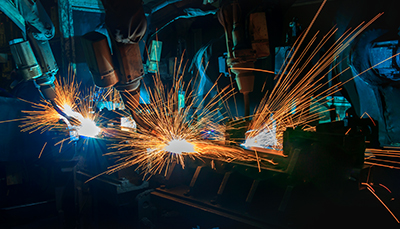What Does the Future Hold for Robotic Welding?

An impossible dream only a few decades ago, robotic welding has changed manufacturing for many industries thanks to continued innovation and research. Today, it’s an essential part of production that boosts companies’ capabilities to new heights by improving processes, safety, and efficiency.
What about tomorrow? What can we expect in the future for robotic welding? Based on what we know right now, it’s a complicated picture. However, there’s much to be excited about as we begin a new decade of robotics innovation.
Demand for Innovation
Developing and implementing new technologies is always a focus when you want to stay ahead, but for robotic welding, it’s likely to be an especially major factor.
The growing need for dynamic and efficient arc welding technology should drive a lot of change in the coming years. More companies’ products are requiring an increased emphasis on manipulating smaller parts at awkward angles as quickly as possible, which necessitates highly precise robotic arms with a wider range of motion and flexibility. As always, increased safety features will likely continue as a focus for new designs, too.
Also, more and more manufacturers are looking for help with evaluating and monitoring their production at all stages, and often connected machinery is the best answer. Genesis Systems focuses a lot of attention on providing these kinds of solutions for companies seeking to improve productivity and reduce any potential machine downtime. With our Connected Solutions capabilities, companies get access to a wealth of data on their machines’ daily operation and performance and can use that information to predict any possible issues and address needed maintenance right away.
Challenges of Operations
Automation is here to stay, not just for manufacturing companies but for a whole host of different industries that seek to improve operations and reduce costs.
Despite their efficiency, automating processes doesn’t fix every problem with a snap of your finger. For instance, take parts logistics and efficiency. Companies have to consider how to effectively utilize parts production and resources to meet buyer demands accurately while not overproducing.
Another important challenge is maintaining a stable workforce and keeping up with training requirements. As robots take on more and more of the actual welding work, we’re seeing many companies increasingly needing more experts to program and maintain those robots. These programmers need the latest training and knowledge on efficient programming so your process can stay up and consistently. Expert programmers are a necessary investment to keep your equipment operating well.
Despite whatever changes or challenges may be on the horizon, one thing’s for sure: Genesis Systems will be here to provide exceptional robotics for welding and manufacturing. Learn more on our site about the automated robotic welding solutions we provide to clients.
Posted in Robotic Welding